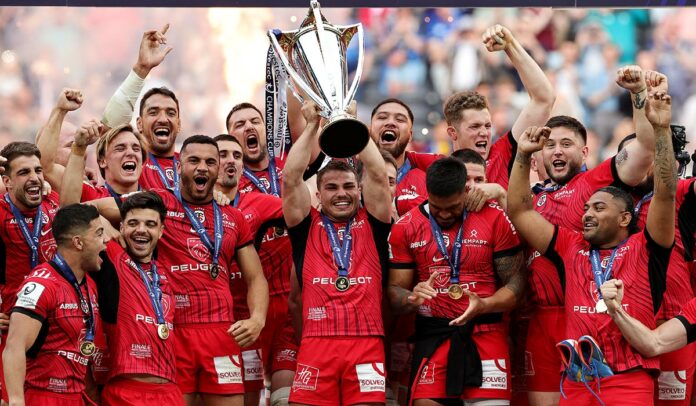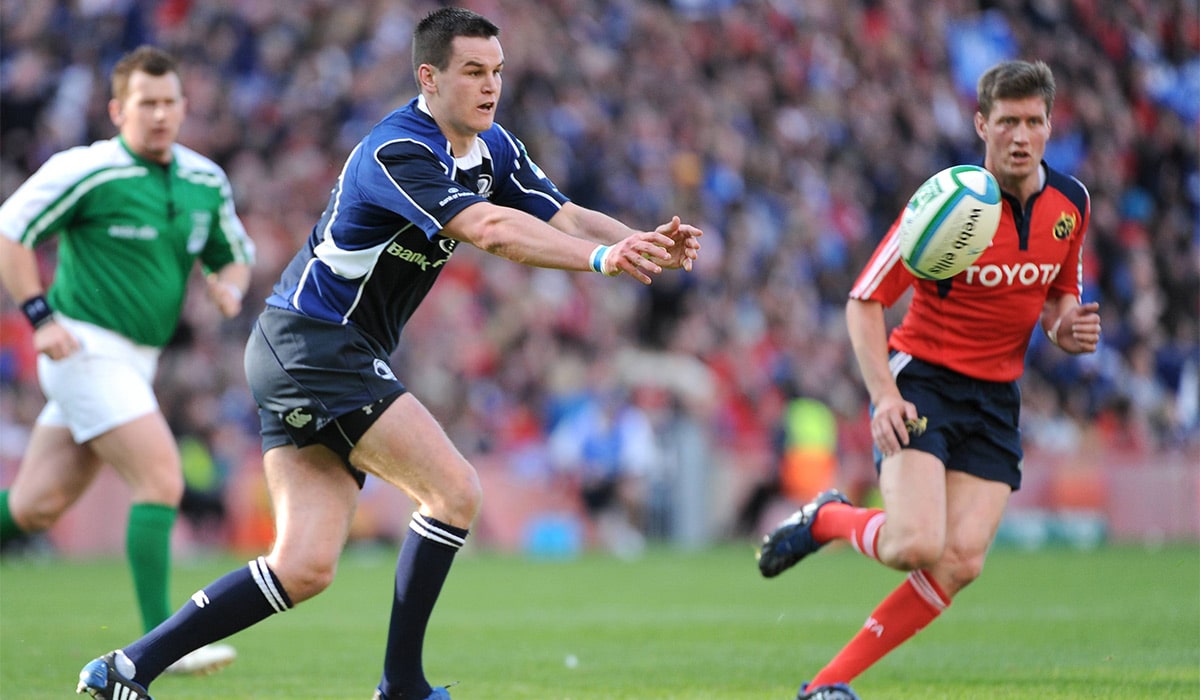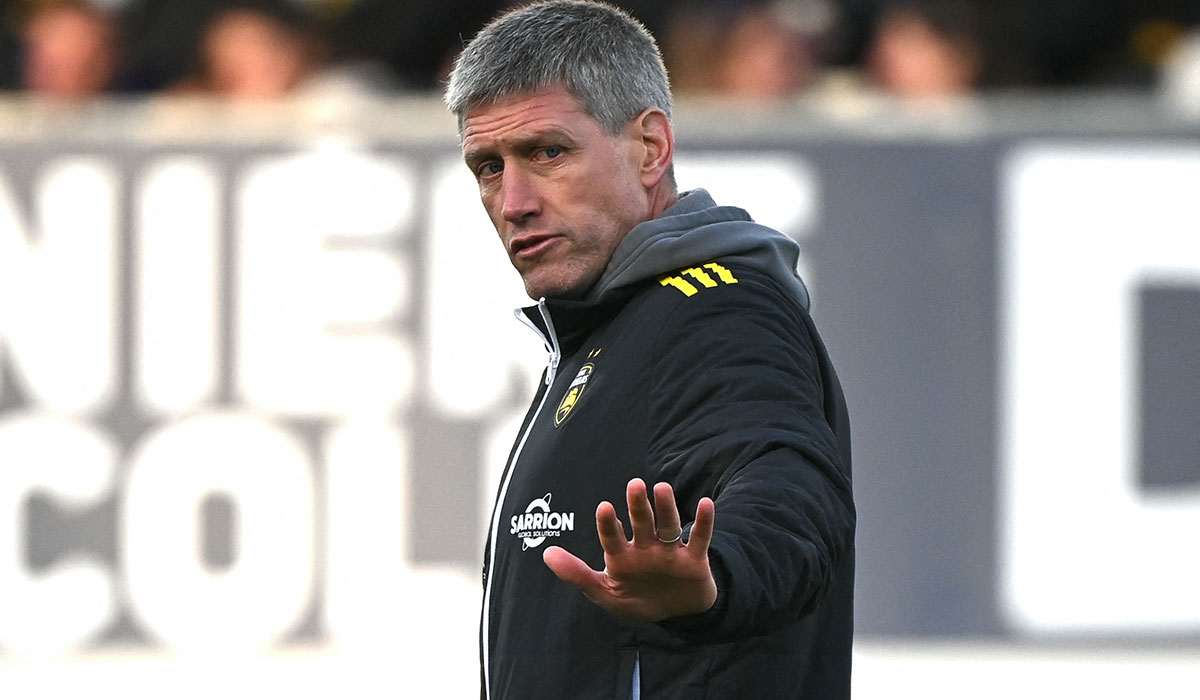
[ad_1]
The Investec Champions Cup has taken a hammering in recent weeks.
This once mighty competition has been on the wane for a long time, with much of the fare on display across the opening two rounds of this convoluted and uninspiring pool format merely crystallising suspicions that it’s a tournament on its last legs.
Well, in its current format anyway.
Investec Champions Cup Round 2, Aviva Stadium, Dublin 14/12/2024
Leinster vs ASM Clermont Auvergne Leinster’s Jordie Barrett celebrates after scoring his side’s second try with Robbie Henshaw and Jamison Gibson-Park. Pic: INPHO/Ben Brady
Lately, there has been no shortage of columns, podcasts and pundits pining for the halcyon days of the Heineken Cup. A brilliant tournament which was run aground by the English and French clubs a decade ago.
And, having spoken to various sources this week for details on the contrast between what was once so successful and is now so uninspiring, it is clear that there have been major failures in terms of governance and vision over the past 10 years.
Glory days
It took a bit of time, but the Heineken Cup really hit its stride at the turn of the century. Toulouse, Brive, Bath and Ulster had won the first four tournaments and over that period, Europe’s premier tournament had yet to grip the wider rugby public.
All that changed when Munster reached their first European final in 2000, going down to Northampton in a nail-bitter in Twickenham. No matter, the province’s quest for the Holy Grail proved gripping viewing in the years which followed.
A big title sponsor in Heineken, the heavyweight multinational beer brewers, was already on board. The heads of Sky Sports were turned, the British broadcasting giants outbid the BBC for viewing rights in 2003 and it proved a fantastic partnership.
 Johnny Sexton, Leinster. Heineken Cup Semi-Final, Munster v Leinster, Croke Park, Dublin. Pic: Matt Browne / SPORTSFILE
Johnny Sexton, Leinster. Heineken Cup Semi-Final, Munster v Leinster, Croke Park, Dublin. Pic: Matt Browne / SPORTSFILE
ERC, the tournament organisers who established the competition in 1995, had grown frustrated with the BBC due to their tight scheduling with the Heineken Cup always fighting for air time before and after games while the news scheduling proved another awkward stumbling block.
When Sky came on board, they had the scope, platforms and financial resources to really sell the Heineken Cup to the masses.
New subscribers could take in every single game across the entire match weekend and the commentary of Miles Harrison and Stuart Barnes became synonymous with big nights in Thomond Park, Stade Marcel-Michelin or Welford Road.
The fans couldn’t get enough of it. The format wasn’t perfect. It was easy to follow, however, with 24 teams competing across six pools. The winners of the six groups qualifying for the quarter-final stage, with the two best performing second-placed teams sneaking in as well. The four teams with the highest points total were given home advantage. Easy.
It also made for some real drama. The home and away pool meetings across December were always box office, especially if the first encounter had been a bit feisty. The scramble for pool points in the final round had supporters hooked on other results. The ‘Miracle Match’ was a direct result of it. It was a different world to the utter drudgery of the current pool format.
And there were plenty brilliant storylines and teams to get behind. From Warren Gatland’s Wasps to the many stellar Toulouse teams. It was great viewing.
It was a glorious time for the Irish provinces, with Munster and Leinster sharing five titles between them across seven trophy-laden seasons. When Joe Schmidt’s Leinster and Ulster met in a 2012 Heineken Cup final at Twickenham, it proved to be the last straw for the English clubs.
Trouble brewing
ERC chiefs knew there were problems beneath the surface for a while. There was always a fragility about the Heineken Cup but that fragility almost became a strength.
It was a minor sporting miracle that ERC managed to get all the warring factions on board in the first place. There was always a level of mistrust and apathy between various parties, namely the England and French clubs with their respective unions. For the best part of 15 years, it worked and the Heineken Cup thrived.
There was an open dialogue from head office in Dublin to all 44 clubs, who were all invited to attend a yearly meeting to air their views, concerns and suggestions.
However, from 2008 onwards, things began to get a bit frosty and contentious in the boardroom.
It was ironic that at the time the competition was doing its best, it came under the most pressure.
The first signs of tension surfaced when ERC were negotiating a fresh TV deal with Sky around this time. Premiership Rugby, England’s professional rugby competition, were also due to sit down with Sky as well to hammer out a new deal.
When the broadcaster told Premiership chiefs that they valued the Heineken Cup higher and would be tabling a far more lucrative offer in those talks, it didn’t go down too well.
 La Rochelle’s Ronan O’Gara Pic: MATTHIEU RONDEL/AFP via Getty Images
La Rochelle’s Ronan O’Gara Pic: MATTHIEU RONDEL/AFP via Getty Images
The French clubs – many of which were run by wealthy and egotistical backers – were also growing increasingly agitated. The ERC prided themselves on being something of a trailblazer in the disciplinary space. Whether it was Bloodgate, doping cases or citing offences, ERC laid down the law. Many of their practices have since been picked up by other high-profile competitions. It didn’t help that a lot of the French clubs fell foul of the sanctions. It went down well with sponsors but it irked a lot of big players in the Top14.
The French were always fighting to give their own league more prominence. Soon, the English and French clubs began to make some noises about leaving the competition.
The Heineken Cup organisers knew this was coming down the track.
In fact, it is understood that ERC chiefs met with all the unions during the 2011 World Cup in New Zealand to warn that a potential coup was coming down the track, but it wasn’t heeded.
On August 23, 2012, a few months after the Leinster-Ulster final, the 12 Premiership clubs – along with their French counterparts – triggered rugby’s equivalent of Article 50 and served two years’ notice that they would be leaving the Heineken Cup. Rugby’s version of Brexit was imminent.
In 24 months, ERC was wound up, with EPCR established in 2014. The main headquarters was switched from St Stephen’s Green in Dublin to Lausanne in Switzerland. One of the many daft decisions from the new organisers.
Derek McGrath, the visionary CEO, left his post having overseen a period of spectacular growth during his 14 years in the gig.
Long-running chairman Jean-Pierre Lux would soon follow suit. The former France centre was a hugely influential administrator who often fought with his own country over issues with the tournament. Lux, who sadly passed away at age 74 in 2020, was well regarded and managed the politics of the tournament with real skill and a lightness of touch.
Money matters
Ahead of the 2014/15 season, the Champions Cup came on board following 24 months of intense negotiations. This new competition was established with then Premiership Rugby chief executive Mark McCafferty and wealthy Bath owner Bruce Craig making some proclamations about the earning power and potential of this new venture.
‘It was a land grab,’ one insider, who prefers not be named, says now. ‘It was an opportunity to emasculate the Irish provinces. What Bruce Craig and Mark McCafferty said back in 2015 was we’re taking over this old tournament from the ERC and the unions and bringing it into the more financial remit of the clubs, which is probably understandable on the face of it.
‘But the big mistake they made with their hubris and arrogance, especially Craig, was, “we’re going to do 100 million a year, those guys in ERC in Dublin don’t have a clue. Wait till you see what we do.”
‘They found out pretty quick. It’s a seriously hard job to actually keep generating the cash, keep sponsors happy, keep broadcasters happy, keep the show on the road.’
The tournament would now have ‘meritocracy’ according to the English clubs with all the competing teams – namely the Irish provinces – now having to qualify through their domestic league. Ironically, the now 10-team English Premiership has eight qualifiers per season since Wasps, Worcester and London Irish all went bust.
 Pic: BT Sport/TNT Sports
Pic: BT Sport/TNT Sports
BT Sport were on board as a new broadcaster while instead of a title sponsor like Heineken, this new 20-team tournament was going to mimic the Champions League model with myriad blue-chip sponsors. When Turkish Airlines came on board as a partner in 2015, it was set to be the first of many big-money backers pouring through the door.
It didn’t quite pan out that way. The extra partners never materialised with Heineken coming back on board as a title sponsor in 2018. It is believed that deal was substantially less lucrative than the original partnership, which was understood to be something in the region of €14million a year during the Heineken Cup era.
The TV rights has also been something of a shambles. TNT Sports – the Warner Brothers Discovery company which had acquired BT Sports – were understood to have tabled an offer of €14million to EPRC to broadcast this season’s competition.
Tournament chiefs apparently stalled, eager to see if there was a bigger offer coming down the track from a rival. TNT subsequently withdrew their offer and duly acquired the rights to broadcast the Autumn Nations Series. In the end, EPCR had to accept a €6million deal with Premier Sports. For the record, the old Heineken Cup had an offer on the table of €20million from Sky Sports in the final round of negotiations before the plug was pulled on ERC.
Investec, the South Africa wealth management group, came on board as title sponsor in 2023, when the Bulls, Sharks, Stormers and Lions were being lined up to join the Champions Cup.
‘Progressing towards a carbon neutral tournament’ was a line which jumped out of the press release announcing this new partnership. How a cross-border competition spanning both hemispheres could achieve such a feat was perplexing.
Again, the Investec partnership points to yet more muddled thinking by EPCR.
‘They attach to sport because it gives them personality so they take more than they give,’ an industry insider notes.
‘It’s not in their interest to sell at a match whereas it is in Heineken’s interest and that was the big shift. Investec will never really impose themselves but it just doesn’t have the same interest for them so they’re not going to pay anything like what a Heineken would.’
The Champions Cup is clearly a disorganised and confused operation off the pitch. It hasn’t helped that the unions, although still major stakeholders, have taken a step back and let the Premiership, URC and Top14 run the show. It goes a long way to explain why the Champions Cup seems to have far less prominence and priority over domestic fare these days.
Busted flush
It hasn’t been a great spectacle on the pitch either. At the insistence of the French clubs, who need 29 weeks for their Top14 calendar, the Champions Cup now has just eight weeks in the schedule.
The pool format has been reduced to four weekends, with a round-robin format which confuses fans. In the old days of the Heineken Cup, words like ‘jeopardy’ and ‘integrity’ were often spoken about in the corridors of power when it came to the structure of the tournament.
Neither are present in the current competition. For one thing, only 50 per cent of participants are eliminated before the last-16 phase. It has led to teams sending weakened teams to rivals, with head coaches knowing that one or two pool results will suffice to secure qualification for the knockout stage.
The logistical problems with the South African teams is a real live issue. When a heavily weakened Sharks outfit – shorn of their Springboks stars – suffered a 56-17 hammering at the hands of Leicester last weekend, their head coach John Plumtree gave a frank and worrying briefing to journalist in the Welford Road press room after the game.
‘I want to go out there and give Leicester a good hiding in front of their home crowd. Don’t worry about that,’ the Kiwi said at the time.
‘We’re all competitive. But the reality is we’ve got to look after these athletes. They are not robots. They don’t front up every week. And right now, the South African boys are treated like robots.’
In the interest of balance, it’s worth pointing out that the Heineken Cup had its fair share of blowouts as well. Bourgoin will live in infamy after the French side had mentally checked out of the 2004 edition of the tournament, with a scratch side suffering a record 92-17 hammering at the hands of Leinster at Lansdowne Road.
But there’s no getting away from the fact that this European competition needs a drastic overhaul.
The problem is, many of the current power brokers, who are only worried about their own self interests, will be allergic to change.
[ad_2]
Copyright for syndicated content belongs to the linked Source link

